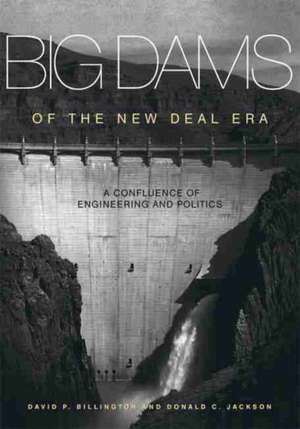Big Dams of the New Deal Era
Autor David P. Billington, Donald C. Jacksonen Limba Engleză Paperback – 29 apr 2017
The massive dams of the American West were designed to serve multiple purposes: improving navigation, irrigating crops, storing water, controlling floods, and generating hydroelectricity. Their construction also put thousands of people to work during the Great Depression. Only later did the dams' baneful effects on river ecologies spark public debate.
Big Dams of the New Deal Era tells how major water-storage structures were erected in four western river basins. David P. Billington and Donald C. Jackson reveal how engineering science, regional and national politics, perceived public needs, and a river's natural features intertwined to create distinctive dams within each region. In particular, the authors describe how two federal agencies, the Army Corps of Engineers and the Bureau of Reclamation, became key players in the creation of these important public works.
By illuminating the mathematical analysis that supported large-scale dam construction, the authors also describe how and why engineers in the 1930s most often opted for massive gravity dams, whose design required enormous quantities of concrete or earth-rock fill for stability.
Richly illustrated, Big Dams of the New Deal Era offers a compelling account of how major dams in the New Deal era restructured the landscape--both politically and physically--and why American society in the 1930s embraced them wholeheartedly.
Preț: 227.16 lei
Nou
43.47€ • 45.50$ • 35.97£
Carte tipărită la comandă
Livrare economică 05-19 aprilie
Specificații
ISBN-10: 0806157623
Pagini: 416
Dimensiuni: 178 x 254 x 19 mm
Greutate: 0.67 kg
Editura: University of Oklahoma Press
Notă biografică
David P. Billington, (1927-2018) was Gordon Y. S. Wu Professor of Engineering Emeritus at Princeton University. His work inspired a generation of scholars and redefined the consideration of great engineering works from bridges to buildings.
